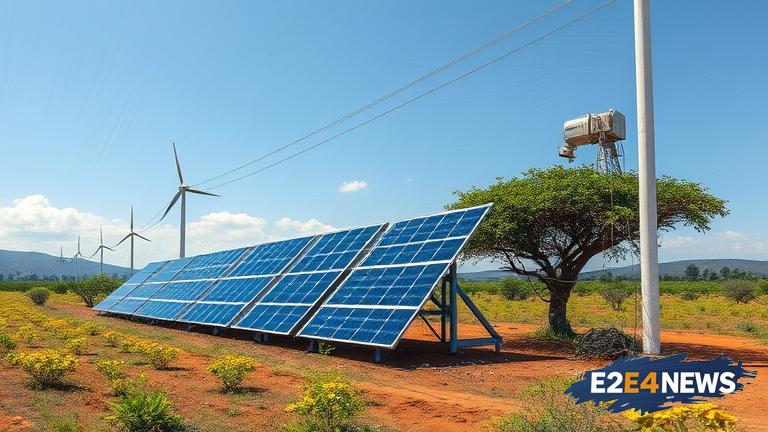The African continent is witnessing a significant shift towards renewable energy, driven by the need to address the pressing issues of energy access, climate change, and sustainable development. With many countries still struggling to provide reliable and affordable electricity to their citizens, renewable energy has emerged as a viable solution. Solar and wind power are leading the charge, with countries like South Africa, Egypt, and Morocco investing heavily in these sectors. The African Renewable Energy Initiative, launched in 2015, aims to achieve at least 300 GW of renewable energy capacity by 2030. This ambitious target is expected to create new economic opportunities, stimulate growth, and improve energy security. Moreover, the adoption of renewable energy can help reduce greenhouse gas emissions, contributing to a cleaner and healthier environment. The use of renewable energy can also enhance energy independence, reducing reliance on imported fossil fuels and promoting regional cooperation. In addition, the development of renewable energy infrastructure can create new job opportunities, stimulate local economies, and improve living standards. Many African countries are already making significant strides in the renewable energy sector, with Kenya, for example, generating over 70% of its electricity from geothermal sources. Similarly, Ethiopia has set ambitious targets to become a carbon-neutral economy by 2025, with a focus on developing its vast renewable energy resources. The private sector is also playing a crucial role in driving the growth of renewable energy in Africa, with companies like Vestas and Siemens Gamesa investing in wind and solar projects across the continent. Furthermore, international organizations like the African Development Bank and the International Renewable Energy Agency (IRENA) are providing critical support and financing to help countries achieve their renewable energy goals. Despite the many benefits of renewable energy, there are still significant challenges to be addressed, including the high upfront costs of investment, lack of infrastructure, and limited access to financing. However, with the right policies and support in place, Africa can unlock its vast renewable energy potential, driving economic growth, reducing poverty, and promoting sustainable development. The continent’s renewable energy revolution is gaining momentum, with new projects and initiatives being launched regularly. For instance, the recently announced Desert to Power initiative aims to develop 10 GW of solar energy in the Sahel region by 2030. This project has the potential to provide electricity to over 250 million people, stimulating economic growth and improving living standards. In conclusion, Africa’s renewable energy sector is poised for significant growth, driven by the need to address the continent’s energy access challenges, reduce dependence on fossil fuels, and promote sustainable development. With the right support and investment, the continent can unlock its vast renewable energy potential, driving economic growth, reducing poverty, and promoting a cleaner and healthier environment. The future of renewable energy in Africa looks bright, with many countries and companies already making significant strides in this sector. As the continent continues to grow and develop, it is likely that renewable energy will play an increasingly important role in shaping its energy landscape. The adoption of renewable energy can also help to reduce the continent’s reliance on imported fossil fuels, promoting energy independence and regional cooperation. Moreover, the development of renewable energy infrastructure can create new economic opportunities, stimulate local economies, and improve living standards. Overall, Africa’s renewable energy revolution is a positive trend that is expected to continue in the coming years, driving economic growth, reducing poverty, and promoting sustainable development.
